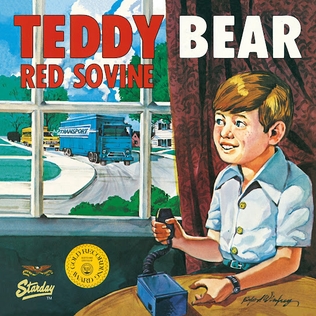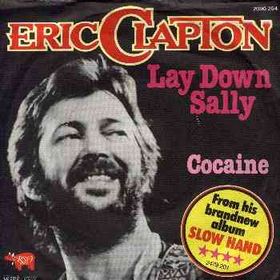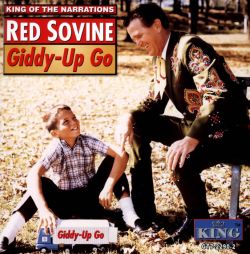
Jimmy Ray Dean was an American country music singer, television host, actor, and businessman. He was the creator of the Jimmy Dean sausage brand as well as the spokesman for its TV commercials. He was a distant cousin of actor James Dean.

"Gentle on My Mind" is a song that was written and originally recorded by John Hartford, and was later popularized by Glen Campbell.

Larry Wayne Gatlin is an American country and Southern gospel singer and songwriter. As part of a trio with his younger brothers Steve and Rudy, he achieved considerable success within the country music genre, performing on 33 top-40 singles. As their fame grew, the band became known as Larry Gatlin and the Gatlin Brothers.
Woodrow Wilson "Red" Sovine was an American country music singer and songwriter associated with truck driving songs, particularly those recited as narratives but set to music. His most noted examples are "Giddyup Go" (1965) and "Teddy Bear" (1976), both of which topped the Billboard Hot Country Songs chart.

"Hey, Good Lookin'" is a 1951 song written and recorded by Hank Williams, and his version was inducted into the Grammy Hall of Fame in 2001. In 2003, CMT voted the Hank Williams version No. 19 on CMT's 100 Greatest Songs of Country Music. Since its original 1951 recording it has been covered by a variety of artists.

"When a Man Loves a Woman" is a song written by Calvin Lewis and Andrew Wright and first recorded by Percy Sledge in 1966 at Norala Sound Studio in Sheffield, Alabama. It made number one on both the Billboard Hot 100 and R&B singles charts. Country singer John Wesley Ryles had a minor hit with his version of the song in 1976 while Singer and actress Bette Midler recorded the song 14 years later and had a Top 40 hit with her version in 1980. In 1991, Michael Bolton recorded the song and his version peaked at number one on both the Billboard Hot 100 chart and the Billboard Adult Contemporary Singles chart.
"I Remember You" is a popular song, published in 1941. The music was written by Victor Schertzinger, with lyrics by Johnny Mercer.
"Young Love" is a popular song, written by Ric Cartey and Carole Joyner, and published in 1956. The original version was recorded by Ric Cartey with the Jiva-Tones on November 24, 1956. It was released in 1956 by Stars Records as catalog number 539 and one month later by RCA Records as catalog number 47-6751. Cartey's version never charted.
A recitation song or "recitation" as it is more commonly called, is a spoken narrative of a song, generally with a sentimental theme. Such numbers were quite popular in country music from the 1930s into the 1960s, although there were only few in number. While they almost disappeared in the 1970s, that decade saw several of the biggest recitation songs of all time: Red Sovine's sentimental ode to an ill child "Teddy Bear" and C. W. McCall's truck-driving saga "Convoy", both songs hitting number one on the country charts and even crossing over into the pop market. McCall, who did not sing, became a popular country star in the 1970s with a string of recitations, most of them comic, although his last hit, 1977's "Roses for Mama" was a sentimental tale in the best Sovine tradition. A number of Elvis Presley's and Johnny Cash's songs, as well as a number of songs from other genres of popular music and a number of gospel songs, also featured recitations.

"No Charge" is a country music song, written by songwriter Harlan Howard. It was first recorded by country singer Melba Montgomery, whose 1974 version was a #1 country hit in both the US and Canada, as well as making #39 on the US pop charts. In the UK, the song is associated with J.J. Barrie, whose 1976 version was a #1 UK hit.

"Another Saturday Night" is the title of a 1963 hit single by Sam Cooke from the album Ain't That Good News. The song was written by Cooke while touring in England when staying in a hotel where no female guests were allowed. It reached No. 10 on the Billboard Hot 100 and was No. 1 on the R&B chart for a single week. In the UK, the song peaked at No. 23 on the UK Singles Chart.

"Sara Smile" is a song written and recorded by the American musical duo Hall & Oates. It was released as the third single from their album Daryl Hall & John Oates. The song was the group's first top 40 and first top ten hit in the US, reaching number four on the Billboard Hot 100.

"Teddy Bear" is a song co-written and recorded by American country music singer Red Sovine. It was released in June 1976 as the title track to Sovine's album of the same name.

"Lay Down Sally" is a song performed by Eric Clapton, and written by Clapton, Marcella Detroit, and George Terry. It appeared on his November 1977 album Slowhand, and reached No. 3 on the Billboard Hot 100 chart.
"Detroit City" is a song written by Danny Dill and Mel Tillis, made famous by Billy Grammer, country music singer Bobby Bare and Tom Jones. Bare's version was released in 1963. The song — sometimes known as "I Wanna Go Home" — was Bare's first Top 10 hit on the Billboard Hot Country Singles chart that summer, and became a country music standard.

"Crying Time" is a song from 1964 written and originally recorded by the American country music artist Buck Owens. It gained greater success in the version recorded by Ray Charles, which won two Grammy Awards in 1967. Numerous other cover versions have been performed and recorded over the intervening years.
"The Race Is On" is a song written by Don Rollins and made a hit on the country music charts by George Jones and on the pop and easy listening charts by the unrelated Jack Jones. George's version was the first single released from his 1965 album of the same name. Released as a single in September 1964, it peaked at number three on the Billboard Hot Country Singles chart and at number 96 on the Billboard Hot 100 in January 1965. Jack's version topped Billboard's Easy Listening chart and reached number 15 on the Hot 100 the same year. The two recordings combined to reach number 12 on the Cashbox charts, which combined all covers of the same song in one listing and thus gave George Jones his only top-40 hit. The song uses thoroughbred horse racing as the metaphor for the singer's romantic relationships.

"Giddyup Go" is a country music song made famous by Red Sovine. Released in 1965, the song was the title track to Sovine's album released that same year.
"Old Rivers" is a country music song written by Cliff Crofford which tells the story of a man recalling a childhood friendship with an elderly farmer. The song was most famously recorded as a recitation by actor and recording artist Walter Brennan.

"Surfin' U.S.A." is a song by the American rock band the Beach Boys credited to Chuck Berry and Brian Wilson. It is a rewritten version of Berry's "Sweet Little Sixteen" set to new lyrics penned by Wilson and an uncredited Mike Love. The song was released as a single on March 4, 1963, backed with "Shut Down". It was then placed as the opening track on their album of the same name.












